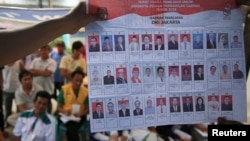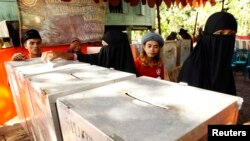JAKARTA —
Indonesia is set for a period of political uncertainty after an unconvincing election win by the main opposition party which will likely force it to find allies to back its candidate in a July vote for president of Southeast Asia's biggest economy.
Investor disquiet at that prospect and a much tougher race to the presidency for the popular candidate of the Indonesian Democratic Party-Struggle (PDI-P) took its toll on Jakarta shares which were down 3.34 percent by the close.
That was about the same percentage that they jumped after the party announced last month it was nominating Jakarta governor Joko “Jokowi” Widodo as its candidate for the July 9 presidential election, and whom many opinion polls before Wednesday's parliamentary election said was certain to win in July.
The rupiah initially slipped but later recovered. Both shares and the rupiah are still around the highest levels since the latter part of 2013.
“The next step for us is to look at which other parties we can cooperate with,” said PDI-P vice secretary general Eriko Sotarduga.
“We are talking with many parties right now.”
The party won just less than 20 percent of the votes in the parliamentary election, according to initial results, the biggest of any party but below a threshold needed to nominate its own presidential candidate.
“It's important to say that we're not going to build a coalition just based on transactional politics, for example they give us their support and we give them something in return,” Sotarduga said.
“We also don't want to build a big coalition because we've seen for the last few years that a big coalition with too many partners can be very ineffective.”
He was referring to the broad coalition government of outgoing President Susilo Bambang Yudhoyono which has been widely criticized for ineffective leadership and whose ruling Democratic Party saw its votes halve on Wednesday.
Ten parties qualified for seats in parliament, opening up the possibility of various coalitions.
“It's going to be weeks before we see any conclusive data,” said political analyst Kevin Evans, though he predicted PDI-P would be able to put Jokowi forward for president without help.
The formal result of the legislative election will not be announced until early May, a little before the May 10 deadline for parties to nominate their candidates for the presidency.
Some analysts said the presidential vote could be forced to go into a second round.
Tough competition
One party happy with Wednesday's vote is Gerindra, headed by ex-general Prabowo Subianto who also has his eye on the presidency.
Prabowo is the son of one of Indonesia's most respected economists although his reputation has been tarnished by allegations of human rights abuses during his military days.
The showing by his party makes him a serious contender for the top job if he manages to find support from other parties.
His is the only party to have produced any substantial policy platform for lifting the economy and helping the large number of poor.
“We are very confident ... We went from 4.5 percent to 12 percent. That's a 300 percent jump,” said Gerindra vice chairman Fadli Zon, referring to the party's improvement over its showing in the last election in 2009.
“So it's possible that it will be a very tough competition between Gerindra and PDI-P from now on. The presidential race is definitely a two-horse race,” he said, adding he doubted the two former allies would join forces again.
Most analysts say the presidential election is still Jokowi's to lose but the Wednesday vote shows his party failed to capitalize on his popularity.
Though Jokowi has no experience on the national political stage, his no-nonsense style and easy approach with ordinary people has raised the former furniture businessman's profile. He is seen by many as a welcome change from the old guard of elitist politicians who have long dominated.
His reputation for cutting through bureaucracy and of straight dealing as Jakarta governor has won him huge support and also encouraged investors that he would oversee more effective policy.
But neither he nor his party have spelled out their policies. There is some concern that once he is in the palace, he might be too beholden to the domineering head of his party, former president Megawati Sukarnoputri.
The parliamentary votes were also more evenly spread across the parties than expected, meaning a more fragmented parliament which could hamper policy in a country which is seen as repeatedly failing to live up to its economic potential.
While growth is slowing, it is expected to be more than 5 percent this year. But many economists say growth is held back by weak infrastructure, widespread corruption and years of indecisive leadership.
In another surprise, Islamic parties looked to have picked up more support than expected. Though Indonesia is home to the world's largest Muslim population, many analysts thought Islamic parties were on the wane because of graft scandals and the greater popularity of more pluralist parties.
Investor disquiet at that prospect and a much tougher race to the presidency for the popular candidate of the Indonesian Democratic Party-Struggle (PDI-P) took its toll on Jakarta shares which were down 3.34 percent by the close.
That was about the same percentage that they jumped after the party announced last month it was nominating Jakarta governor Joko “Jokowi” Widodo as its candidate for the July 9 presidential election, and whom many opinion polls before Wednesday's parliamentary election said was certain to win in July.
The rupiah initially slipped but later recovered. Both shares and the rupiah are still around the highest levels since the latter part of 2013.
“The next step for us is to look at which other parties we can cooperate with,” said PDI-P vice secretary general Eriko Sotarduga.
“We are talking with many parties right now.”
The party won just less than 20 percent of the votes in the parliamentary election, according to initial results, the biggest of any party but below a threshold needed to nominate its own presidential candidate.
“It's important to say that we're not going to build a coalition just based on transactional politics, for example they give us their support and we give them something in return,” Sotarduga said.
“We also don't want to build a big coalition because we've seen for the last few years that a big coalition with too many partners can be very ineffective.”
He was referring to the broad coalition government of outgoing President Susilo Bambang Yudhoyono which has been widely criticized for ineffective leadership and whose ruling Democratic Party saw its votes halve on Wednesday.
Ten parties qualified for seats in parliament, opening up the possibility of various coalitions.
“It's going to be weeks before we see any conclusive data,” said political analyst Kevin Evans, though he predicted PDI-P would be able to put Jokowi forward for president without help.
The formal result of the legislative election will not be announced until early May, a little before the May 10 deadline for parties to nominate their candidates for the presidency.
Some analysts said the presidential vote could be forced to go into a second round.
Tough competition
One party happy with Wednesday's vote is Gerindra, headed by ex-general Prabowo Subianto who also has his eye on the presidency.
Prabowo is the son of one of Indonesia's most respected economists although his reputation has been tarnished by allegations of human rights abuses during his military days.
The showing by his party makes him a serious contender for the top job if he manages to find support from other parties.
His is the only party to have produced any substantial policy platform for lifting the economy and helping the large number of poor.
“We are very confident ... We went from 4.5 percent to 12 percent. That's a 300 percent jump,” said Gerindra vice chairman Fadli Zon, referring to the party's improvement over its showing in the last election in 2009.
“So it's possible that it will be a very tough competition between Gerindra and PDI-P from now on. The presidential race is definitely a two-horse race,” he said, adding he doubted the two former allies would join forces again.
Most analysts say the presidential election is still Jokowi's to lose but the Wednesday vote shows his party failed to capitalize on his popularity.
Though Jokowi has no experience on the national political stage, his no-nonsense style and easy approach with ordinary people has raised the former furniture businessman's profile. He is seen by many as a welcome change from the old guard of elitist politicians who have long dominated.
His reputation for cutting through bureaucracy and of straight dealing as Jakarta governor has won him huge support and also encouraged investors that he would oversee more effective policy.
But neither he nor his party have spelled out their policies. There is some concern that once he is in the palace, he might be too beholden to the domineering head of his party, former president Megawati Sukarnoputri.
The parliamentary votes were also more evenly spread across the parties than expected, meaning a more fragmented parliament which could hamper policy in a country which is seen as repeatedly failing to live up to its economic potential.
While growth is slowing, it is expected to be more than 5 percent this year. But many economists say growth is held back by weak infrastructure, widespread corruption and years of indecisive leadership.
In another surprise, Islamic parties looked to have picked up more support than expected. Though Indonesia is home to the world's largest Muslim population, many analysts thought Islamic parties were on the wane because of graft scandals and the greater popularity of more pluralist parties.











